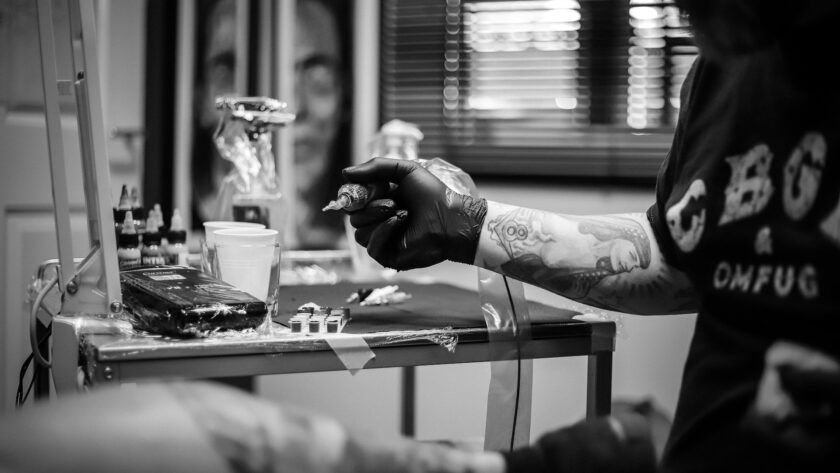Tattooing has become an increasingly popular form of self-expression in the United States. However, age restrictions vary significantly across the country, making it crucial to understand the laws in your specific state.
While most states set the minimum age for getting a tattoo at 18, some allow minors to get inked with parental consent, and a few impose stricter regulations or outright bans. These laws aim to protect young people from making impulsive decisions that could have lifelong consequences. Additionally, they reflect cultural and legal perspectives on maturity and autonomy. Understanding these state-specific regulations not only helps minors and their parents navigate the legal landscape but also ensures that tattoo artists comply with the law, avoiding potential penalties.
General Age Requirements for Tattoos in the USA
In the United States, the general legal age to get a tattoo is 18, which is consistent across most states. This standard is in place because 18 is typically recognized as the age of majority, where individuals are considered capable of making permanent decisions about their bodies without parental oversight. However, some states allow minors under 18 to receive tattoos if certain conditions are met, such as parental consent and presence during the procedure.
These exceptions vary widely, reflecting different cultural attitudes toward body modification and the perceived maturity of younger individuals. The rationale behind setting the age limit at 18 includes concerns about the long-term implications of tattoos, such as potential regrets or the impact on future job prospects. Moreover, there is a recognition that minors may not fully grasp the permanence of tattoos, leading many states to impose strict regulations or outright bans on tattooing individuals under 18.
States Where Tattoos Are Allowed at 16 with Parental Consent
Several states in the U.S. allow minors as young as 16 to get tattoos, provided they have parental consent. In Florida, for example, 16-year-olds can get a tattoo if they are accompanied by a parent or legal guardian, and both parties present valid identification. Additionally, a notarized consent form is required, ensuring that the decision is well-considered and documented. Idaho also permits tattooing minors starting at age 14, provided there is written parental consent, which must be executed in the presence of the tattoo artist.
Kansas requires that the parental consent be notarized, and the parent or guardian must be present during the tattooing process. In Louisiana, minors aged 16 and up can get a tattoo if a parent or guardian is present and provides consent. New Jersey allows tattooing at 16 with the written permission of a parent or guardian. Lastly, Wyoming mandates that both parental consent and presence are necessary for minors to receive tattoos, and age verification is required. These states exemplify how legal frameworks can accommodate the desires of minors to get tattoos while ensuring that parents are involved in the decision-making process.
| State | Requirements |
|---|---|
| Florida | 16-year-olds can get a tattoo if accompanied by a parent or guardian. Both must provide valid IDs, and a notarized consent form is required. |
| Idaho | Allows tattooing for minors starting at age 14 with written parental consent. Consent must be executed in the presence of the tattoo artist. |
| Kansas | Tattoos permitted for 16-year-olds with notarized parental consent. A parent or guardian must be present during the tattoo procedure. |
| Louisiana | Minors aged 16 and older can get a tattoo with the presence and consent of a parent or guardian during the procedure. |
| New Jersey | Allows tattoos at 16 with written permission from a parent or guardian. |
| Wyoming | Requires both parental consent and presence during the tattoo procedure for minors seeking tattoos. |
States with Strict Prohibitions on Tattooing Minors
In contrast to states that permit tattooing minors with parental consent, several states maintain strict prohibitions against tattooing anyone under the age of 18, regardless of parental involvement. California is a prime example, where it is illegal to tattoo anyone under 18, and violators face legal consequences. New York enforces similar restrictions, categorically banning tattoos for minors, which reflects the state’s concern about the maturity and long-term judgment of younger individuals.
Massachusetts also prohibits tattooing minors, underscoring the belief that individuals under 18 should not make permanent decisions about their bodies. In Texas, while the law is generally stringent, there is an exception that allows minors to get tattoos if they are covering up an existing obscene or offensive tattoo, provided they have parental consent. These prohibitive laws highlight the different approaches states take towards protecting minors from making potentially regrettable decisions, ensuring that only adults can legally obtain tattoos.
Unique State Regulations
Some states have unique regulations that either deviate from the norm or include additional stipulations. Nevada, for instance, does not have statewide regulations governing tattooing, leaving it up to local jurisdictions like Clark County (Las Vegas), which imposes its own rules. This lack of uniformity can create confusion for both tattoo artists and clients, especially minors seeking tattoos. South Carolina has one of the more unusual laws, requiring individuals to be at least 21 to get a tattoo, though those aged 18 and older can do so with parental consent.

Source: https://giphy.com/gifs/mrw-thanks-server-XR9Dp54ZC4dji
This regulation reflects the state’s particularly cautious approach to body modification, possibly influenced by cultural or religious factors. Washington and Wisconsin stand out for their stringent laws, prohibiting tattoos for minors even with parental consent, unless the procedure is performed by a licensed physician. These states exemplify the diverse regulatory landscape in the U.S., where tattoo laws can vary not only by age requirements but also by who is authorized to perform the procedure and under what circumstances.
Role of Tattoo Artists and Studios
Tattoo artists and studios play a crucial role in upholding the legal and ethical standards of the tattoo industry, particularly when it comes to tattooing minors. Despite the legality in some states, many tattoo artists refuse to ink individuals under 18, even with parental consent. This decision often stems from ethical concerns about the maturity of minors and the lifelong consequences of getting a tattoo. Artists may also be wary of the potential legal repercussions if a minor later regrets the decision and takes legal action.
Additionally, some tattoo artists have personal boundaries, refusing to tattoo certain body parts or designs they find inappropriate, regardless of the client’s age. The tattoo industry is highly regulated, with artists required to follow strict health and safety guidelines to prevent infections and other complications. Therefore, it’s important for both minors and their parents to choose reputable, licensed tattoo studios that adhere to these standards. Doing so ensures that the tattoo process is safe and that the final result is a piece of art that the client can be proud of for years to come.
Legal and Social Implications
The legal and social implications of tattooing minors are significant and multifaceted. Legally, tattoo artists who violate state laws by tattooing minors without proper consent can face severe penalties, including fines and the loss of their license. This underscores the importance of adhering to state regulations to avoid legal complications. Socially, the decision to get a tattoo at a young age can have lasting consequences. While tattoos have become more socially acceptable, they still carry a stigma in certain professional environments, which can affect job prospects for young adults.
Moreover, the permanence of tattoos means that a decision made at 16 could result in regret later in life, especially if the tattoo was chosen impulsively or under peer pressure. This is why many states require parental consent and presence during the tattooing process—to ensure that the decision is made with full awareness of its long-term implications. Understanding these legal and social factors is crucial for minors considering a tattoo, as well as for their parents and guardians who are responsible for guiding them through this decision.
Conclusion
Understanding the laws and regulations surrounding tattooing for minors is essential for anyone considering getting a tattoo before the age of 18. While some states allow minors to get tattoos with parental consent, others have strict prohibitions in place to protect young individuals from making decisions they might later regret. Tattoo artists and studios also play a vital role in this process, often setting their own age limits and ensuring that all procedures are carried out safely and legally.
For minors and their parents, being well-informed about the legal landscape can help them make responsible decisions that respect both the law and the long-term implications of body art. As tattooing continues to grow in popularity, these regulations will likely evolve, but the underlying principles of safety, consent, and maturity will remain central to the discussion.
FAQ: Can You Get a Tattoo at 16 in the USA?
1. Is it legal to get a tattoo at 16 in the United States?
In most U.S. states, the legal age to get a tattoo is 18. However, some states allow minors to get tattoos at 16 with parental consent. The regulations vary widely, so it’s essential to check the specific laws in your state.
2. Which states allow 16-year-olds to get tattoos with parental consent?
States like Florida, Idaho, Kansas, Louisiana, New Jersey, and Wyoming permit 16-year-olds to get tattoos, provided they have parental consent and follow specific legal requirements, such as notarization of consent forms or the presence of a parent during the procedure.
3. Are there any states where it’s completely illegal to get a tattoo under 18, even with parental consent?
Yes, several states, including California, New York, and Massachusetts, prohibit anyone under 18 from getting a tattoo, regardless of parental consent. These states maintain strict regulations to protect minors from making potentially regrettable decisions.
4. What are the potential legal consequences for tattoo artists who tattoo minors illegally?
Tattoo artists who violate state laws by tattooing minors without proper consent can face significant legal consequences, including fines, loss of licensure, and even criminal charges. It is crucial for tattoo artists to adhere strictly to state regulations to avoid these penalties.
5. Why do some states have stricter tattoo laws for minors?
Stricter tattoo laws for minors are generally in place to protect young individuals from making permanent decisions that they may later regret. These laws also reflect concerns about the maturity and understanding of minors regarding the long-term implications of getting a tattoo.
6. Can a tattoo received at 16 have social or professional implications later in life?
Yes, while tattoos have become more socially accepted, they can still carry a stigma in certain professional environments. A tattoo received at 16, especially one chosen impulsively, might affect job prospects or personal perceptions later in life, making it essential to carefully consider this decision.
7. Are there any exceptions for minors to get tattoos under special circumstances?
In some states, exceptions are made, such as in Texas, where a minor can get a tattoo to cover an existing offensive or obscene tattoo with parental consent. Each state has its own set of rules, so it’s important to be familiar with them.
8. What should parents and minors consider before getting a tattoo at 16?
Before getting a tattoo at 16, it’s crucial to consider the long-term implications, the reputation and safety standards of the tattoo studio, and ensure that the decision is well thought out. Parental involvement is key in this process, as it provides a support system and ensures that all legal requirements are met.





